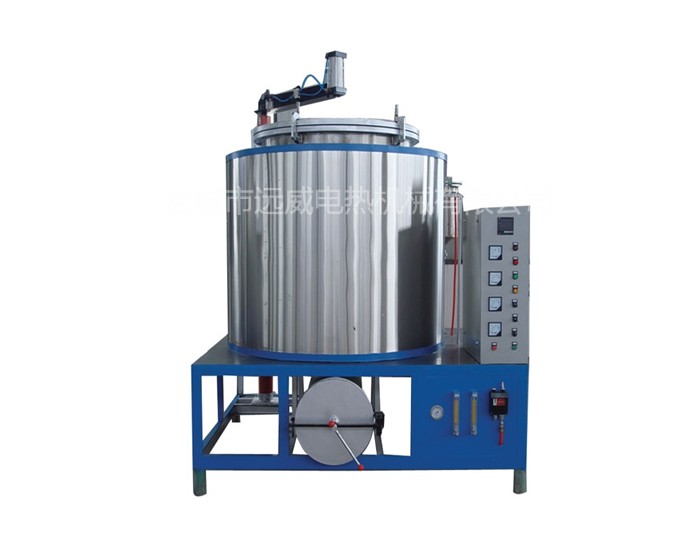|
YW-ZKL系列真空清洗炉适用于化纤行业的涤纶、锦纶和丙纶生产用的组件、喷丝板、过滤芯等清洁处理,也适用于塑料挤出行业的模具清洁之用。
该设备利用高分子聚合物在300度左右时可熔融,高于300度隔绝空气可裂解焦化,高于400度在有少量空气的环境中可完全氧化的特性,先将粘有高分子污物的工件加热到300度(根据工艺要求拟定),使工件上数量较多的高分子聚合物熔化后流淌到炉膛下部的收集容器内,然后再将炉温升到400-500度,同时打开真空泵,并通入少量新鲜空气,使剩余的聚合物充分氧化,生成的二氧化碳,经水喷淋后通过水环式真空泵抽吸,和水一起排出炉外。
该系列真空清洗炉均采用不锈钢电热管真空炉膛内直接加热,密封部位均采用耐高温密封圈,不需水冷却保护,所以,该设备加热功率小,热效率高,升温速度快,温度均匀性好,加热器检查维修方便,较炉外带式加热器加热节电40%,节水60%,并且,克服了由于水冷却导致的炉内温度均匀性差,局部清洗效果不好等缺陷。该设备具有完整的自动化工作性能,只要对程序温度控制仪输入拟定的工作程序,设备即能进行自动化清洗工作,中途无需人工操作,并具有超温、缺相和断水或低水压报警功能。
该系列真空清洗炉均采用不锈钢电热管真空炉膛内直接加热,密封部位均采用耐高温密封圈,不需水冷却保护,所以,该设备加热功率小,热效率高,升温速度快,温度均匀性好,加热器检查维修方便,较炉外带式加热器加热节电40%,节水60%,并且,克服了由于水冷却导致的炉内温度均匀性差,局部清洗效果不好等缺陷。
该设备具有完整的自动化工作性能,只要对程序温度控制仪输入拟定的工作程序,设备即能进行自动化清洗工作,中途无需人工操作,并具有超温、缺相和断水或低水压报警功能。
主要技术参数
|
型号 |
炉膛尺寸 |
外型尺寸 |
使用功率kw
加热/真空泵 |
真空度MPa |
耗水量
m/h3 |
控制精度
±℃ |
|
LZKL-A |
Φ500×600 |
1200×1800×2100 |
18/22.2 |
-0.07-0.085 |
0.23 |
2 |
|
LZKL-B |
Φ600×800 |
2200×2000×2300 |
21/2.2 |
-0.07-0.085 |
0.23 |
2 |
|
LZKL-C |
Φ800×1000 |
2600×2300×2500 |
27/3 |
-0.07-0.085 |
0.28 |
2 |
|
LZKL-D |
Φ1000×1200 |
2800×2500×2700 |
32/4 |
-0.07-0.085 |
0.45 |
2 |
|
JZKL-A |
600×400×400 |
1600×1200×1000 |
18/2.2 |
-0.07-0.085 |
0.23 |
2 |
|
JZKL-B |
800×600×600 |
1800×1300×1100 |
21/3 |
-0.07-0.085 |
0.28 |
2 |
|
JZKL-C |
1000×800×600 |
2100×1500×1300 |
27/3 |
-0.07-0.085 |
0.28 |
2 |
|
JZKL-D |
1200×800×800 |
2100×1500×1600 |
32/4 |
-0.07-0.085 |
0.45 |
2 |
|
WZKL-A |
Φ500×600 |
2000×1000×1300 |
18/2.2 |
-0.07-0.085 |
0.23 |
2 |
|
WZKL-B |
Φ600×900 |
2400×1100×1600 |
21/2.2 |
-0.07-0.085 |
0.23 |
2 |
|
WZKL-C |
Φ800×1100 |
2600×1200×1800 |
27/3 |
-0.07-0.085 |
0.28 |
2 |
|
WZKL-D |
Φ1000×1500 |
2800×1400×2000 |
32/4 |
-0.07-0.085 |
0.45 |
2 |
|
WZKL-T |
Φ2000×4800 |
10000×5000×5000 |
360/7.5 |
-0.07-0.085 |
0.70 |
2 |
|
|
The stove is suitable to clean the sets, spinneret and filter core which are used in the producing of terylene, Chinlon and polypropylene in chemical fiber industry. It can also be used to clean the die in plastics extrusion industry.
Based on the high polymer characters such as melting around 300℃, fissioning and coking above 300℃, and oxidizing above 400℃ with a little air, the work pieces adhered with high polymer dirt, firstly, should be heated up to 300℃ to melt these high polymers and make them drip to the collector below the hearth. And then, have the remainder polymer sufficiently oxygenated by heating the stove up to 400-500℃ and turn on the vacuum pump to absorb a little fresh air at the same time. After sprayed by the water, the resultant carbon dioxide will be ejected out together with the water by water-circle vacuum pump.
These stoves are all made of stainless steel electrical heating tube heated in the vacuum hearth, and all the sealing parts apply high temperature-resistant seal rings. As a result, they are provided with many advantages such as low heat-up power, high thermal efficiency, fast heating up, even temperature distribution, convenience in maintenance, 40% electricity power saving and 60% water saving. And they have also overcomed the shortcomings of bad homogeneity of the temperature in the stove and poor cleaning effects in some location, which result from the water cooling.
In addition, they can do the cleaning job automatically by inputting the program into the temperature controller without manual operation. They also have the features of exceeding temperature, open phase, water break-off and warning ability to low water pressure. |










